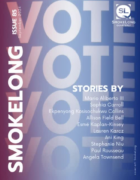“Family Night” is written in a run-on style, each paragraph being a single sentence. Why did you choose this structure for the piece?
Initially, this piece was all one long sentence, but after reading it out loud a couple of times, it had a better overall rhythm as three longer sentences. This allowed for a sense of beginning, middle, and end in a story that is rooted in repetition of habits, trauma, moments, and conversations.
Darla is an interesting character, and Darla interacts with Dad more than anyone else in the world of the story. Can you discuss why it was essential to include Darla and what larger context or point of view they might represent?
I think Darla is the character who brings the whole story together in a way: she’s an outsider to some extent, so she doesn’t have the shared experiences Dad’s kids do, but she has the most similarities to Dad’s experiences. By being vulnerable, she offers Dad a way to reveal more of himself than an interaction with his kids or wife would. She has the potential to be a character he doesn’t connect with. She’s queer, she’s dating his daughter, she is neither Irish nor Italian, and there’s the implication she isn’t Catholic, but he sees someone who shares a grievance, a loss and chooses to offer more connection.
Topics of race, sexuality, gender, war, and illness surface throughout the piece. Did you set out to touch on those issues at the start of writing “Family Night,” or did you find that they surfaced on their own as you began writing in the voice of the unnamed narrator?
I started this story with the phrase “the worst person in the nursing home” rattling around in my head, fresh off a conversation with my partner about how aging people are often infantilized, so I knew I wanted to lens through a character who was perhaps pretty unlikeable, but once I started writing it was a total “yes, and why” experience where Dad just kept revealing himself and a lot of this is exploration of how contradictory someone can be, how all these experiences add up for better or worse. I also think race, sexuality, war, illness, and so on are dinner-table topics for a lot of families. Even when we’re talking around them, they’re present or the reason we hold some views but not others.
At the end of the piece, Dad slips into what seems to be the repetitive nature of dementia and loops back to “Did you know my mother was Irish?” Can you talk about how/why you chose to end the piece that way?
It felt like this moment needed to loop back to the beginning because, in a way, that’s what Dad is doing through this story. He’s always going to go back to the same place, and the way he relates to his family is a result of living in the same place. But we do have this moment where he does something different. He acknowledges this huge thing in his past, and it felt natural after that to end in a place that felt like it was about to repeat.
What work(s) have you read recently and loved?
Bliss Montage by Ling Ma: A lot of these stories peel back in so many layers, from beginnings that root in oddity to moments that are terribly relatable.
Evil Flowers by Gunnhild Øyehaug: None of these stories care about rules. They’re weird on the surface and at the core. As a reader, they poke at many tender bits around parenting and aging and museums on the sly. As a writer, they inspire me to play around with form and point of view and veer harder into the strange, especially as a vehicle for things humans just go through.
“Solemnly Swear” by Glenn Orgias: I read this story earlier today, and it will stick with me for a long time. This one is a masterclass on revealing a story through a narrator who feels more unreliable than they are.



 The SmokeLong Grand Micro Contest (The Mikey) is now an annual competition celebrating and compensating the best micro fiction and nonfiction online.
The SmokeLong Grand Micro Contest (The Mikey) is now an annual competition celebrating and compensating the best micro fiction and nonfiction online.